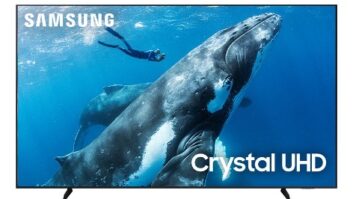The combination of a new generation of innovative digital products and a still feisty, if long-in-the-tooth bull market, is proving to be an irresistible sales driver for consumers.
In turn, these factors are also contributing to something of a boomlet for companies that provide the financing programs to retailers and manufacturers that allows consumers to make these big-ticket purchases on credit.
According to executives at General Electric Card Services, Transamerica Distribution Finance, and Household Retail Services USA – three of the largest retail finance companies serving the consumer electronics and appliance industries – manufacturers in particular are taking an aggressive role in arranging for credit-based promotions in order to support both their dealers and their new product rollouts.
Meanwhile, although no company is reporting any breakthrough innovations in the types of products or services they are providing – or that merchants and suppliers are requesting – they say their private-label credit card businesses are holding their own against the national-brand bank cards and big-bucks marketing campaigns that help drive VISA and MasterCard usage.
And while retail financiers remain committed to their core brick-and-mortar clientele, the companies are also busy laying the groundwork for what they expect will eventually be a robust online business with both virtual retailers and those storefront-based businesses that are branching off into cyberspace.
But despite the rosy outlook, the credit companies are fully aware that any downturn in the economy, bearish growl from Wall Street, or perhaps even the quarter-percentage-point rise in short-term interest rates that the Federal Reserve is expected to make at the end of the month, could radically weaken consumers’ confidence and their tolerance for taking on debt.
For the time being, amid the flurry of new credit opportunities and the favorable short-term outlook, finance executives are holding on tight and enjoying the ride.
“Business has been strong for us for the first half of the year, and I expect that the second half, which is always positive because of Christmas, will be strong too,” said Dave Luster, director of sales for Transamerica Distribution Finance, the Newcastle, Del.-based subsidiary of Transamerica Bank N.A.
“Consumers’ enthusiasm seems very strong,” Luster continued, “and I don’t get the sense that they are holding back. The consumer electronics industry is also very enthusiastic about HDTV, plasma-screen TVs and other new products. Anytime you have hot new products, it generates interest and enthusiasm. The manufacturers want to get them out there, and they’re calling for promotions.”
Dick Klesse, executive VP of business development and client relationships at Household Retail Services USA in Prospect Heights, Ill., has also been riding the bull market wave.
“Business has been very good for us, and a lot of our retailers, particularly in the consumer electronics sector, have done very well,” he said, due to strong consumer confidence. “Consumers are doing very well and spending money, which I would guess includes some of their stock gains. They’re financing larger ticket merchandise using special financing options because they’re confident in their job stability.”
The downside of that personal prosperity, however, is that consumers are also paying off their debt in a timely fashion in order to take full advantage of today’s longer-term same-as-cash and no-interest promotions. “They incur no interest fees by paying off the balance, and so they’re paying it off,” Klesse said.
Although merchants – with the occasional subsidy assist from manufacturers – wind up footing the bill for these longer-term promotions, the net effect is a win-win for the store and the credit service because these programs “help the merchant make the sale,” he said.
Indeed, according to Clyde McKay, director of GECAF programs for GE Card Services in Atlanta, a one-year-old joint venture with Bank/One Private Label Credit Services, payout rates have increased “significantly” over the past three years, catching GE somewhat by surprise and causing the cost of credit programs to go up.
“Someone has to pay more for it, so we’ve tried to balance the adjustment between the consumer, the retailer and the manufacturer,” said McKay. “But retailers are very concerned about the higher costs.”
Still, consumer demand for special financing arrangements continues unabated, he said. “People are confident enough to take on debt, although it’s reached an all-time high on a per capita basis. The price points on some of the new digital products require credit for the man on the street, as opposed to the early adopters.”
To encourage usage, manufacturers appear fully prepared to foot some of the bill.
“It’s a common approach, and part of our strategy to work with vendors to provide part of the cost to help keep dealers’ costs down,” said McKay.
The same holds true at Transamerica, which is currently running a series of six- to 12-month same-as-cash promotions for Pioneer on plasma and high-definition TVs.
“The combination of the new products and the promotions are generating store traffic,” Luster reported, and is helping retail finance companies fend off bank cards.
“That’s what’s nice about industry-type credit programs,” he continued. “They give consumers choices by allowing for programs like these, and they let them use their VISA cards for other things.”
GECAF’s McKay concurred, pointing to the greater personal financial freedom that private-label credit cards provide.
“Bank cards are multi-utility cards. You can buy socks with them at Macy’s, or pick up a car at a dealership,” he said. “Private-label cards offer an additional line of credit, and they don’t tie up a consumer’s credit line with big-ticket purchases.”
In dollar-and-cents terms, most private-label cards also give consumers 90 days or more to pay off their balance before incurring interest charges, as opposed to bank cards which generally allow 21 to 26 days, McKay said.
Klesse, who came to Household Retail Services following its buyout of Beneficial National Bank USA Corporation nearly one year ago, also sees private label cards as a means to “attach customers” to retailers.
“The monthly communication with their customers keeps the store brand top-of-mind,” he observed. It also provides value to consumers by offering them special promotions such as the now popular same-as-cash, or no interest for one year offers; special sales and discounts; and in some instances, free gift wrapping, he said.
So, how much longer will the good times roll for credit companies?
Although the fortunes of McKay’s GECAF group are tied to sales trends at the small- to mid-size dealers his unit serves, the outlook for the balance of 1999 appears upbeat. “The consumer is confident, the stock market is strong,” he said. “The rest depends on [Federal Reserve Board chairman Alan] Greenspan and what he’s going to do.”













